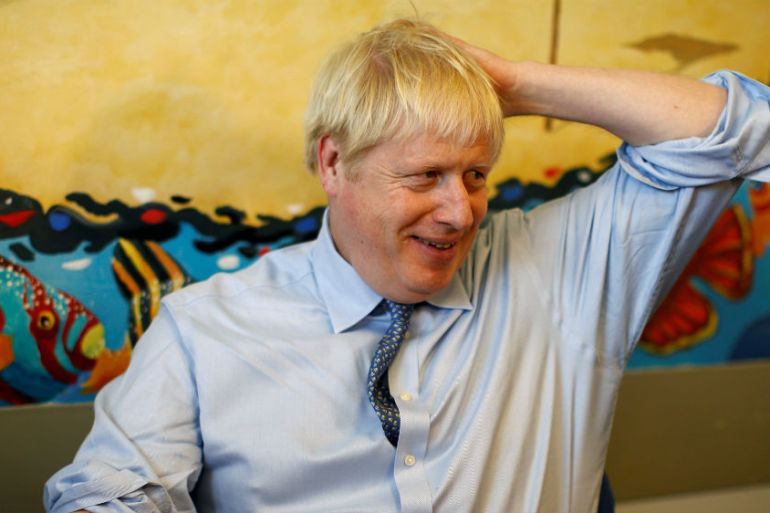Boris Johnson’s Brexit backstop bid rejected by EU leaders
Britain’s new prime ministers wrote to European leaders suggesting Irish backstop position be removed from Brexit deal.

The European Union has rebuffed United Kingdom Prime Minister Boris Johnson’s demand that it reopen a divorce deal about Britain’s exit from the bloc, or Brexit, saying the country had failed to propose any realistic alternative to an agreed insurance policy for the Irish border.
After more than three years of Brexit crisis, the UK is heading towards a showdown with the EU as Johnson has vowed to leave the bloc on October 31 without a deal unless it agrees to renegotiate the divorce terms.
Keep reading
list of 4 itemsWhy are British farmers pleading for a universal basic income?
Northern Ireland agreement could end deadlock, restore government
Forced to become British: How Brexit created a new European diaspora
In his opening bid to the EU ahead of meetings with French President Emmanuel Macron and German Chancellor Angela Merkel, Johnson wrote a four-page letter to European Council President Donald Tusk asking to axe the Irish border “backstop”.
Johnson proposed that the backstop – part of the withdrawal agreement his predecessor, Theresa May, agreed last year – be replaced with a “commitment” to invent and implement an as-yet-unknown solution in an as-yet-undefined transition period as part of a post-Brexit relationship.
|
|
Merkel, Europe’s most powerful leader, said the EU would consider “practical solutions” – but that the withdrawal agreement did not need to be changed.
“It is a question of the declaration on future ties,” Merkel said during a visit to Iceland. “And I think we will act in a very unified way.”
Brussels was even more direct.
“Those against the backstop and not proposing realistic alternatives in fact support re-establishing a border [between the Republic of Ireland, part of the EU, and Northern Ireland, which is part of the UK]. Even if they do not admit it,” Tusk wrote on Twitter.
A note seen by Reuters news agency setting out the agreed joint position of the 27 EU states staying on after Brexit said the bloc regretted Johnson’s bid to scrap a “necessary, legally operative solution” in favour of a “commitment to try to find a solution”.
Britain’s pound, sensitive to the prospects of a no-deal departure, fell after Tusk’s comments to near three-year lows against the euro and the dollar, before recovering its losses after Merkel’s comments.
Jo Swinson, leader of the opposition Liberal Democrats, tweeted: “Boris is making demands he knows the EU will turn down so he can blame them for no-deal Brexit. He’s set his sights on crashing us out without a deal, and we have to stop him.”
Swinson has rejected a proposal by Jeremy Corbyn, the leader of the main opposition Labour Party, to oust Johnson, replacing him with a time-limited caretaker administration led by him and tasked with delaying Brexit and holding a new general election.
Brexit brinkmanship
European diplomats expect little progress on Brexit until the British domestic landscape becomes clearer when Parliament returns on September 3 – after which Labour has vowed to try to collapse Johnson’s government.
With British politics in turmoil, it is still unclear how, when or indeed if the UK will leave the EU. Many expect an election within months.
A diplomat from one EU country told Reuters that Johnson’s letter was “pure PR” and not meant to spur constructive talks but rather set the stage for a “blame game” with the EU.
The riddle of what to do about Ireland’s 500km land border with Northern Ireland has repeatedly imperilled Brexit talks.
The EU wants to ensure that its only land border with the UK after Brexit does not become a back door for goods to enter the bloc’s single market – which guarantees free movement of goods, capital, services and labour.
But Ireland says checks could undermine the 1998 Good Friday Agreement, which brought peace after more than 3,600 died in a three-decade conflict between unionists who wanted Northern Ireland to remain British and Irish nationalists who want Northern Ireland to join a united Ireland ruled from Dublin.
The UK does not want any border – effective or virtual – between Britain and Northern Ireland. Johnson’s government is propped up by Northern Irish unionists.
The backstop was aimed at squaring the circle: it would keep the UK in a customs union with the EU until a better solution was found, and keep Northern Ireland aligned to the rules of the EU’s single market.
In his letter, Johnson wrote that the backstop was anti-democratic and threatened the UK’s sovereignty as the application of single-market rules in Northern Ireland could divide the region from the rest of the UK.